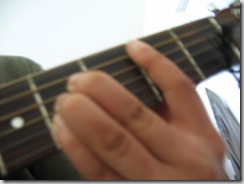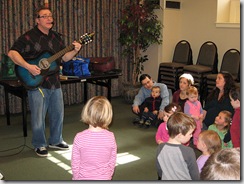arranging Christmas
My band doesn’t do many concerts - the main reason we rehearse regularly is because we love it! But we do get quite a few Christmas gigs, and over the years our repertoire has gradually added just about every Christmas song there is. And a couple of years ago, I had a moment of inspiration that resulted in the arrangement of Wonderful Christmas Time.
(In case you’re wondering, the moment of inspiration was this: previously, we’d only ever been able to do a cappella songs involving our guitarist if he was singing the tune – he’s great when he’s on the tune, but has trouble singing any other parts. But I had the song in my head, and it suddenly occurred to me that he should be able to sing not just the tune, but also the bass notes in the intro ... because they’re all the same note, and there are no other notes happening at the same time to put him off! The arrangement fell into place easily from there.)
I was delighted that we had a rehearsal planned for the next day, so I didn’t have to wait long to hear my arrangement. (I can hear very well in my head or on the computer, but it’s not the same as actual people performing!) I handed out the music, and we sight-read it, and at the end there was a brief moment of silence, after which we all looked at each other and literally laughed in delight. That’s happened a few times since then, but that night was the first. So, why were we so delighted?
Well, partly it was because we’d successfully sight-read the song with very few mistakes - it wasn’t perfect, but it was close enough that we didn’t need to stop at any point, and no-one got lost. This is quite a satisfying thing to be able to do, and we were all well aware that not many groups would be able to manage it as well as we could, so we felt very accomplished (and, yes, rather smug).
However, I think that even vocal groups who don’t use sheet music would enjoy this arrangement (we’ve loved it every time we’ve sung it, even though it’s not been sight-reading since that first time), and I want to try to identify a few of the reasons why.
1. allocating the tune
I mentioned earlier that my guitarist can usually only cope with a cappella songs if he’s singing the tune, and indeed he does get the tune through most of this arrangement - but he doesn’t have it all the way through. We all get a bit of it too.
Off the top of my head, I can’t think of any enjoyable a cappella songs in which one part has the tune throughout - variety is important. (Personally I also tend to prefer arrangements in which the sopranos hardly get the tune at all, but that’s probably because I'm an alto and I’m subconsciously trying to redress the balance!)
2. backing vocal lyrics
Many a cappella arrangements of pop songs have the backing parts singing nonsense syllables, because they’re impersonating instruments. This can actually work very well if the arranger knows what they’re doing - these parts can be great fun to sing! But I think it’s even more fun if the nonsense syllables are occasionally replaced by actual lyrics.
You have to be careful, though - this only really works if either the music is homophonic at that point (i.e. the backing parts have the same words - at the same time - as the part that has the tune) or the tune is having a rest. Otherwise, the result tends to be that all the words get muddied together and none of them can be heard.
3. interesting chords
Of course, this is usually down to the composer rather than the arranger, but it can be very satisfying to sing a series of chords that aren’t just basic triads (i.e have only three notes in them). My band particularly likes major sevenths, and there are loads of them in this song! Interesting chords also tend to result in close harmonies, which are always fun if it's a good enough group of singers. (Close harmonies are hard!)
4. appropriate vocal range and tessitura
This is never an issue when I’m writing for my band, because we've sung together for many years and I know their voices quite well. But I’ve certainly sung arrangements that I haven’t enjoyed very much because the arranger seemed not to know about tessitura (see Chris’s post But I can’t sing that high! for more about tessitura).
The actual range of printed parts is usually fine - even if you’re a new arranger, it’s easy enough to find out (from books or the internet) about the appropriate vocal range for each part. (Sibelius, the most popular score-writing software, even colours the notes red automatically if you go outside the standard range.)
But range is only half of it - tessitura has to be considered as well. If you’ve never heard the word, it refers to the part of the range that's used most in a particular song. For example, a soprano part that includes a lot of middle Cs would be described as having a very low tessitura - sopranos can sing a middle C, but it’s towards the bottom of their range, and if they had to sing a whole song in which most of the notes were in that area, they’d be quite uncomfortable. Whereas I’m a 2nd alto, so I like to sing low notes... and any arrangement which involves my part being mostly an octave (or more) above middle C is not going to be one of my favourites.
5. balance
Considerations of range and tessitura go hand in hand with the question of balance. By ‘balance’, I mean: can the tune be heard clearly, and are all the other parts audible - matching each other if necessary - without drowning the tune? In a choir, balance will usually need to be fixed by the conductor regardless of what the arranger does, because it’s very rare that a choir has exactly the right number of people in every section. But the arranger can make this an impossible task if he/she is incompetent.
Choral arrangements tend to be based on the assumption that there will be roughly the same number of people on each part - if an arrangement doesn’t assume that, it won’t work if anyone tries to sing it with one person on each part (and you never know when that might happen!)
So you might think that there would be all sorts of problems caused by the fact that most choirs have far fewer tenors and basses than they do sopranos and altos. But actually, unless the numbers are stupidly uneven, the balance should be OK, because in general men can sing louder than women.
There are further tessitura-related aspects that the arranger needs to take into account, too. If the sopranos or tenors are singing high notes, they’re likely to drown everyone else unless the dynamics are carefully indicated (and often even then!) Conversely, if the altos or basses have the tune, everyone else will need to shut up. There’s more to it than this, but you get the idea!
6. dynamics
Lots of songs don’t have many different dynamics in them – they’re sort of “loudish” all the way through - but some dramatic variations in dynamics can make arrangements immediately much more interesting; Wonderful Christmas Time, for example, has lots of sudden (and slightly corny) diminuendos. Great fun!
7. easy to sing
Well, we don’t want it to be too easy (no sense of accomplishment!) but there are ways of avoiding unnecessary difficulty.
The main one involves making the leaps between consecutive notes in the harmony parts as small as possible, unless you have a good reason not to. It’s much easier for singers to work out the next note if it’s the same as the previous one, or only one step away. Inexperienced choral arrangers tend to be quite bad at remembering this!
For example, imagine that the backing parts are singing a C major chord: the bottom part is on C, the middle part is on E and the top part is on G. The next chord turns out to be A minor. That's not too hard - they could all move down, so that the bottom part is on A, the middle part is on C and the top part is on E. (They could move up to the A, C and E an octave higher, but that would be a much bigger leap and therefore much harder - and it would sound horrible as well!) But you’ll have noticed that two of the three notes are the same in both chords ... so why not keep the bottom part on the C and the middle part on the E, and just move the top part to A?
There might be reasons why you don’t want to do that - the most likely of these would be that the bottom part is the actual bass part and it has a surprisingly big effect on the music when the root of the chord (the A in this case) isn’t in the bass part - but your default strategy should always be to let the parts move to the nearest possible note wherever possible.
8. geography
This probably isn’t such a big issue in choirs that don’t use sheet music, but I bet it’s still an issue! When I’m rehearsing with my band, if a song falls apart, nine times out of ten it’s a geography issue.
My score of Wonderful Christmas Time has no repeats - you start singing at the beginning, you keep turning the pages, you reach the end. I’m willing to bet that if it had had any repeats, we wouldn’t have successfully sight-read it without stopping at the first attempt.
It’s very easy to forget, in the heat of the moment, which page (or section on a page) you need to turn back to, and if there are alternative words for verse 2, that’s even worse! (And don't get me started on music in which the words are written under verse 1, and all the other words are in a block at the bottom of the page. Argh!)
there you go
So, there you go. Eight factors that contribute to good choral arrangements. They're not intended to be in order of priority – they’re all important. Mind you, that’s not to say that a good arrangement has to have all these features - but if it doesn’t, the arranger will have a good reason why not. What I am saying is that all these factors need to be considered.
Of course, the choir could then go on to ruin a brilliant arrangement by singing out of tune ... but that’s another story!
Jocelyn Lavin, Vamp Till Ready









